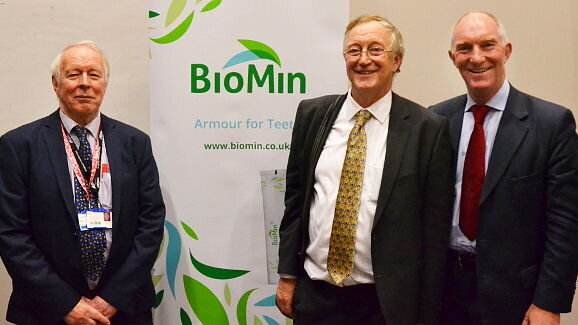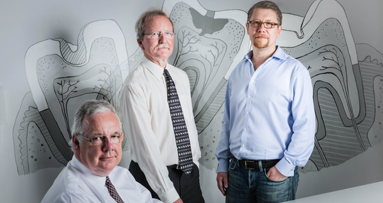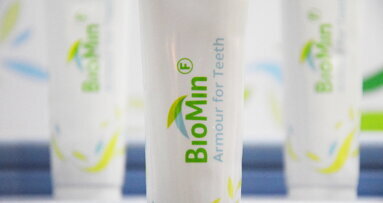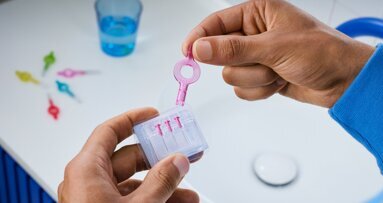LONDON, UK: With the BioMin calcium fluoro-phosphosilicate, dental researchers from Queen Mary University of London have developed a material that has the potential to significantly reduce dental decay and solve tooth sensitivity when used as an ingredient in common oral hygiene brands. On Wednesday, the first commercial product was presented to the public in the form of a remineralising toothpaste during a press launch at the Royal London Hospital Dental Institute.
The BioMinF will only be available to dental professionals in the UK through wholesalers for the time being, BioMin Technologies CEO Richard Whatley said. A launch in high-street stores, however, is anticipated for the end of this year. For users who do not want to brush with a fluoride toothpaste, a fluoride-free version is currently in development. Whatley further added that his company is in talks about licensing the product for use in other dental products, including polishing pastes, varnishes and restorative dental materials.
“Our aim is for the BioMin brand to become synonymous with the treatment of tooth sensitivity in the eyes of both the dental professional and the general public,” he said.
In 2013, the promising invention received the Armourers and Brasiers’ Venture Prize, an annual award given to breakthrough innovations in materials science from the UK. A bioactive glass, it has been developed to adhere to tooth structure through a special polymer, from where it slowly dissolves ions that form fluorapatite, a mineral also found in shark teeth, over an 8–12-hour period to make teeth more resistant to acids from food. According to BioMin founder and Queen Mary Director of Research Prof. Robert Hill, the process has been proven to be more effective than the use of fluorides in conventional toothpastes or professional prophylaxis materials, which are washed away and lose their effect more quickly.
In addition, the fluorapatite formed from brushing with BioMinF toothpaste has shown to effectively reduce dentine hypersensitivity by sealing open dentinal tubules in in vitro studies at Queen Mary.
The team now intends to conduct long-term studies on the effects of the material over the course of the next two years.
Corrections: A previous version of the article incorrectly stated that the press launch took place at the Royal Dental Hospital.
PERTH, UK: Teeth restored without drilling is the dream of almost every dental patient. A new approach developed in the UK that utilises an electrical ...
LONDON, UK: In May, the first toothpaste containing bioactive glass was introduced to the public at Queen Mary University of London. Now, a group of ...
LEEDS, England: Researchers from the University of Leeds, in collaboration with the University of Manchester and the University of Sheffield, have launched ...
LONDON, UK: At the start of 2018, all UK-based dentists were required to adopt the new approach to continuing professional development (CPD) outlined by the...
London, UK: The global paediatric oral care market is currently estimated to be worth USD 9 billion. A global Research and Markets report shares that the ...
KRIENS, Switzerland: In the UK, despite significant advancements in oral health awareness, there remains a critical gap in education around interdental ...
LONDON, UK: Public Health England (PHE) has launched a new Change4Life campaign to encourage parents to reduce their children’s sugar consumption and help...
SENDAI, Japan: A new study has found that periodontal disease and tooth loss are linked to brain shrinkage in the hippocampus, which plays a role in memory ...
Advances in technology in dentistry have rapidly improved diagnostics, streamlined treatments and made the dental chair a safer, more comfortable place. ...
LONDON, UK: The UK government is currently holding a consultation on appropriate indemnity cover for health care professionals who are not covered by any ...
Live webinar
Tue. 24 February 2026
6:00 pm UTC (London)
Prof. Dr. Markus B. Hürzeler
Live webinar
Tue. 24 February 2026
8:00 pm UTC (London)
Prof. Dr. Marcel A. Wainwright DDS, PhD
Live webinar
Wed. 25 February 2026
4:00 pm UTC (London)
Prof. Dr. Daniel Edelhoff
Live webinar
Wed. 25 February 2026
6:00 pm UTC (London)
Live webinar
Thu. 26 February 2026
1:00 am UTC (London)
Live webinar
Tue. 3 March 2026
4:00 pm UTC (London)
Dr. Omar Lugo Cirujano Maxilofacial
Live webinar
Wed. 4 March 2026
1:00 am UTC (London)
Dr. Vasiliki Maseli DDS, MS, EdM



 Austria / Österreich
Austria / Österreich
 Bosnia and Herzegovina / Босна и Херцеговина
Bosnia and Herzegovina / Босна и Херцеговина
 Bulgaria / България
Bulgaria / България
 Croatia / Hrvatska
Croatia / Hrvatska
 Czech Republic & Slovakia / Česká republika & Slovensko
Czech Republic & Slovakia / Česká republika & Slovensko
 France / France
France / France
 Germany / Deutschland
Germany / Deutschland
 Greece / ΕΛΛΑΔΑ
Greece / ΕΛΛΑΔΑ
 Hungary / Hungary
Hungary / Hungary
 Italy / Italia
Italy / Italia
 Netherlands / Nederland
Netherlands / Nederland
 Nordic / Nordic
Nordic / Nordic
 Poland / Polska
Poland / Polska
 Portugal / Portugal
Portugal / Portugal
 Romania & Moldova / România & Moldova
Romania & Moldova / România & Moldova
 Slovenia / Slovenija
Slovenia / Slovenija
 Serbia & Montenegro / Србија и Црна Гора
Serbia & Montenegro / Србија и Црна Гора
 Spain / España
Spain / España
 Switzerland / Schweiz
Switzerland / Schweiz
 Turkey / Türkiye
Turkey / Türkiye
 UK & Ireland / UK & Ireland
UK & Ireland / UK & Ireland
 International / International
International / International
 Brazil / Brasil
Brazil / Brasil
 Canada / Canada
Canada / Canada
 Latin America / Latinoamérica
Latin America / Latinoamérica
 USA / USA
USA / USA
 China / 中国
China / 中国
 India / भारत गणराज्य
India / भारत गणराज्य
 Pakistan / Pākistān
Pakistan / Pākistān
 Vietnam / Việt Nam
Vietnam / Việt Nam
 ASEAN / ASEAN
ASEAN / ASEAN
 Israel / מְדִינַת יִשְׂרָאֵל
Israel / מְדִינַת יִשְׂרָאֵל
 Algeria, Morocco & Tunisia / الجزائر والمغرب وتونس
Algeria, Morocco & Tunisia / الجزائر والمغرب وتونس
 Middle East / Middle East
Middle East / Middle East


















































To post a reply please login or register